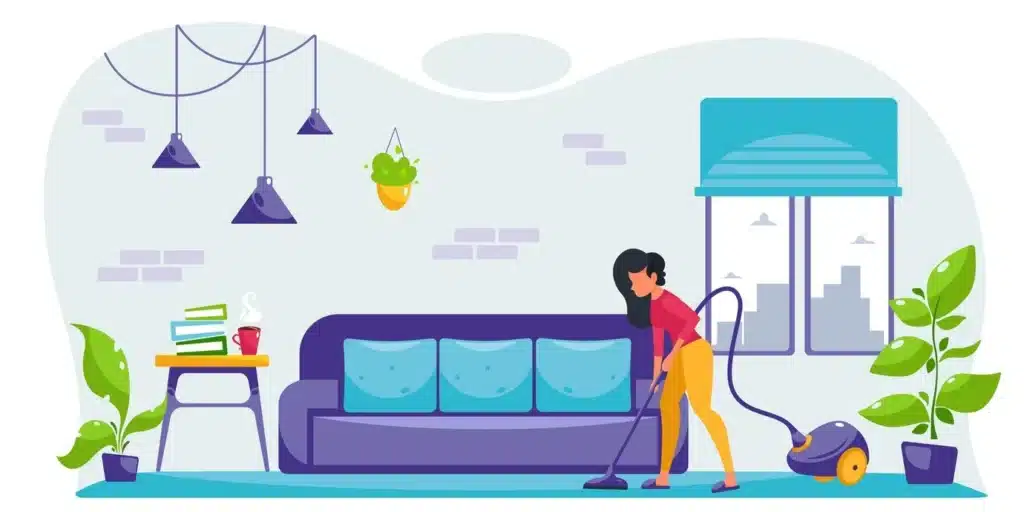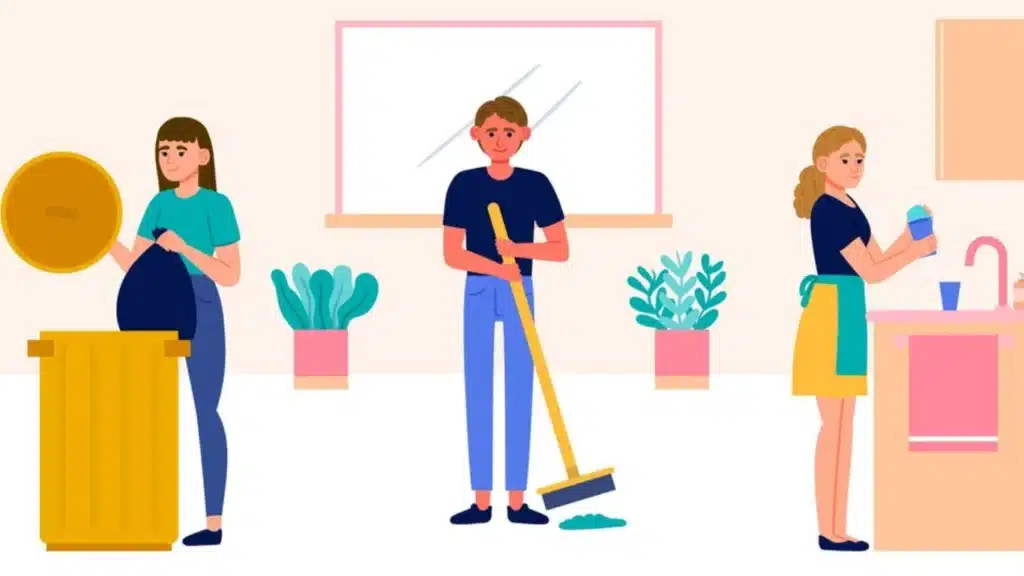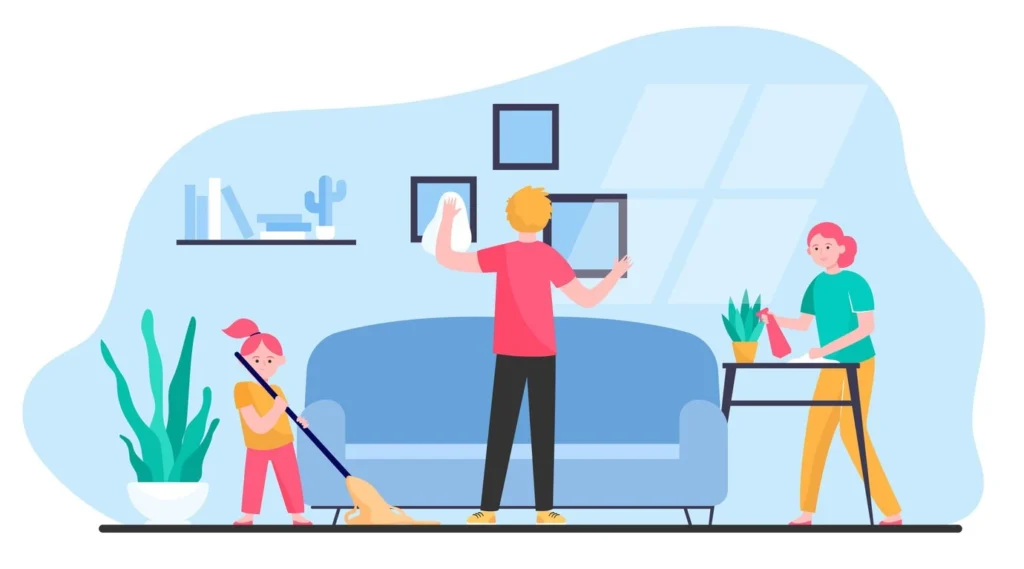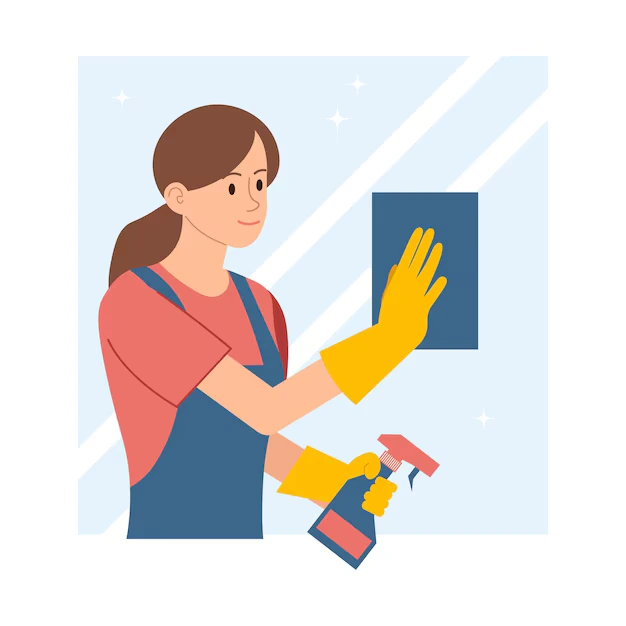Keeping a clean home goes far beyond aesthetics. It directly impacts your physical health, mental well-being, and overall lifestyle. Whether it’s an ongoing house cleaning or a thorough deep clean, house cleaning plays a vital role in creating a peaceful, healthy living environment.
In this blog, we’ll uncover the key reasons why house cleaning is important. We’ll also explore how you can incorporate cleaning into your routine in a way that’s manageable and effective.
How Cleanliness Affects You and Your State of Mind
An unclean home does not just affect your mental well-being and physical health. But surprisingly, it also tells a lot about you as a person.
1. Cleanliness is like a Mirror
Think of cleanliness as a reflection of yourself. A disorganized workspace frequently reflects a crowded mentality, which can result in procrastination and a general lack of drive. When your surroundings are neglected, it’s easy for unhealthy habits to take root. That disarray can become a visual representation of internal disorganization, impacting your daily life.
2. Dirty environment affects your Immunity
Living in a dirty environment is like inviting illness. Bacteria and allergens thrive in unclean spaces, constantly challenging your immune system. This can lead to recurring sickness, weakening your overall health. For kids, it’s even more critical; a dirty home can hinder their physical and mental development, impacting their growth.
3. The worst: Clutter affects your Mental Health
Clutter’s not just messy, it’s a mental drain. Dirty spaces breed brain fog and stress. That laundry pile? Those dishes? They’re constant, nagging reminders, stealing your peace. Even a little mess throws off your focus, making you irritable. Your house ought to be a sanctuary rather than a battlefield with outstanding tasks.
Why House Cleaning Is More Than Just a Chore: The Benefits

Cleaning may seem like a routine task, but its benefits extend well into areas such as health, mood, and productivity. Cleanliness and mental health are highly associated. In short, when your space is clean, your mind feels clearer too.
Let’s take a closer look at the hidden benefits of house cleaning.
1. Mental Health and Cleanliness Go Hand in Hand
You know, even just doing little cleaning tasks—like tackling those dishes or sorting out a shelf—can give you this real sense of ‘I got this!’ It’s like a mini-win, right? And those repetitive motions, like wiping down a counter? Weirdly calming. It’s as if your brain experiences a moment of calm. You zone in, get focused, and suddenly, you’re not as stressed. It’s like a tiny break for your mind, plus you get a clean space out of it. Seriously, just assume it’s a sneaky way to boost your mood and dial down the anxiety. Here’s a summary of the three main advantages:
Mini-wins, major mood boost
Completing small tasks provides a sense of accomplishment, directly improving your mood.
Mindful Movement
Repetitive cleaning actions act as a form of meditation, allowing you to zone out and de-stress.
Visual calm
A tidy space reduces visual stimulation, which can be overwhelming, leading to a calmer mental state.
2. A Clean Home Supports Physical Health
It’s not just your mind that benefits from a tidy space, your body does too. Regular cleaning helps reduce allergens like dust mites, pet dander, and mold, all of which can trigger respiratory issues or worsen conditions like asthma and allergies. Keeping floors vacuumed, surfaces wiped down, and fabrics clean can make a real difference in the air you breathe every day.
In fact, research shows that people who live in clean homes are generally healthier than those who don’t. A study found that individuals with clean houses were more likely to be active and had better overall physical health than those in cluttered or dirty spaces. According to the researchers, a clean home was a greater sign of good health than neighborhood walkability.
If you or someone in your household suffers from allergies, asthma, or other respiratory concerns, a regular cleaning routine isn’t just about appearances—it’s a form of preventive health care. A cleaner home helps reduce exposure to irritants and supports a healthier indoor environment for everyone under your roof.
3. Gain Control and Boost Productivity
When life feels chaotic, many people find comfort in tidying up their homes. Cleaning provides an opportunity to restore control. It creates structure during uncertain times and reduces feelings of helplessness. Studies have shown that cleaning routines help people manage stress by offering a repetitive, structured task that feels productive. Having a clean environment also limits distractions, allowing you to work and think more clearly. And most importantly, it makes you more disciplined and a better person.
4. Festivities and Celebrations: Get Ready for Special Occasions
A clean home sets the perfect stage for the holidays and seasonal celebrations. Whether it’s Thanksgiving dinner, a Christmas party, or guests dropping by after a Black Friday shopping spree, a tidy space makes everyone feel welcome—and keeps the stress off your shoulders.
Think of it as gifting yourself peace of mind. A pre-Christmas cleaning checklist can help you tackle often-forgotten areas like guest rooms, baseboards, or the oven before holiday cooking kicks in. Thanksgiving gatherings feel cozier when your living room and kitchen are spotless. And once Boxing Day rolls around, a clean, organized home makes it easier to reset after the festivities.
So when the holiday rush hits, a little planning and maybe even help from a professional cleaning service can make all the difference. That way, you spend less time scrubbing and more time enjoying the laughter, food, and company that make these celebrations special.
How to Begin with Home Cleaning?

Starting a home cleaning routine can feel overwhelming, especially if you’ve let chores pile up or don’t know where to begin. Whether you’re doing a one-time deep clean or setting up a weekly schedule, having a clear starting point makes everything more manageable. Here are a few essential measures to assist you in starting:
1. Start with Decluttering
Before you clean, clear the clutter. A tidy space makes cleaning quicker and more effective. Focus on surfaces, floors, and entryways.
- Pick up misplaced items (clothes, toys, paperwork)
- Organize or discard things you no longer use
- Use containers or bins to temporarily organize items that are similar.
2. Create a Cleaning Checklist
A room-by-room checklist helps you stay focused and ensures no area gets missed.
- List all rooms and major surfaces
- Note specific problem areas (greasy kitchen backsplash, dusty shelves)
- Prioritize based on need and time available
3. Gather Your Cleaning Supplies
Before you begin, make sure that everything is available. This reduces interruptions and keeps the process smooth.
- All-purpose cleaner, disinfectant, sponges, microfiber cloths
- Mop, vacuum, broom, gloves, and garbage bags
- Specialized items for tough stains or tasks (e.g., oven cleaner, grout brush)
Pro-Tip: Check the complete cleaning tools and supplies checklist before starting house cleaning.
4. Clean One Room at a Time
Tackle each room completely before moving to the next. This keeps the process organized and gives you a sense of accomplishment as you go.
- Start from top to bottom: dust high surfaces first, then clean floors (may be your hardwood floor wax)
- To be productive, concentrate on a single task (such as dusting the entire room).
- Save bathrooms and kitchens for last—cleaning kitchen faucet head usually take more time
5. Use the “15-Minute Rule” for Motivation
Feeling stuck? Commit to just 15 minutes of cleaning. You’d be surprised how much you can get done—and once you start, it’s easier to keep going.
6. Set a Realistic Schedule
Nothing needs to be done in a single sitting. Spread tasks across the week to make cleaning less stressful.
- Monday: Dust and vacuum common areas
- Wednesday: Kitchen and dining area
- Friday: Bathrooms
- Sunday: Change bed linens, laundry, trash
7. Don’t Skip the Details
The small things matter. Cleaning light switches, doorknobs, and remote controls can help reduce germs and improve the feel of your space.
Pro Tip: If time is tight or the task feels too big, consider hiring a professional cleaning service to help you get started. Mesh Maids offers one-time and recurring cleaning plans to give your home a fresh start and keep it that way.
Child-Safe and Pet-Friendly Cleaning Tips

Compared to adults, children and pets are more sensitive to toxins and messes. To protect them, follow these simple cleaning tips:
- Avoid harsh chemicals: Stay away from cleaners with ammonia, bleach, or artificial fragrances. These can irritate skin, eyes, and lungs.
- Keep supplies out of reach: Store all cleaning tools and sprays in locked cabinets or high shelves.
- Clean high-touch areas often: Wipe down doorknobs, switches, and tabletops daily to prevent the spread of germs.
- Vacuum regularly: Pets shed hair and dander, while kids tend to drop crumbs. To capture dust and allergens, use a vacuum with a HEPA filter.
- During and after cleaning, open windows to allow fresh air to enter. You can also use nature’s air purifier for improved air quality.
Age-Appropriate Chores for Kids
Getting your kids involved in cleaning teaches responsibility and makes your job easier. Here are some simple chores kids can handle by age group:
- Ages 3–5:
- Put toys away
- Dust low surfaces with a cloth
- Put toys away
- Ages 6–9:
- Make their bed
- Wipe down tables and counters
- Fold laundry
- Make their bed
- Ages 10–12 and up:
- Vacuum or sweep
- Load/unload the dishwasher
- Take out the trash
- Vacuum or sweep
Make it fun by setting timers, playing music, or using chore charts with rewards. When cleaning becomes a routine, kids learn valuable life skills early.
Why Eco-Friendly Products Are Safer for Families
Traditional cleaning products often contain strong chemicals that can cause allergies, skin irritation, or breathing issues in children and pets. Eco-friendly cleaners are a safer choice because they are:
- Non-toxic and biodegradable
- Free from artificial dyes and fragrances
- Less likely to cause allergic reactions
- Safe to use around babies, toddlers, and pets
Look for products that have certifications like EcoLogo, Green Seal, or USDA Certified Biobased. You can even make your own natural cleaners using vinegar, baking soda, and lemon juice.
Seasonal House Cleaning: Why It Matters
Cleaning your home throughout the year keeps things fresh, but seasonal house cleaning takes things a step further. It helps you tackle what regular cleaning often misses and gets your space ready for the months ahead.
1. The Importance of Spring and Fall Cleaning
The best seasons for refreshing your house are spring and fall. Doing spring cleaning gets rid of dust, pet hair, and old air after a long winter. In fall, a deep clean prepares your home for more time spent indoors during cooler months.
These seasonal cleanings:
- Improve indoor air quality
- Reduce allergens and bacteria
- Improve the atmosphere of your home by making it more spacious, inviting, and conveniently arranged.
- Extend the life of furniture, carpets, and appliances
What to Prioritize Each Season
Here’s what to focus on when deep cleaning your home during spring and fall:
Spring Cleaning Priorities:
- Wash windows and screens (Use best window cleaner for outside windows)
- Dust baseboards, ceiling fans, and vents
- Clean behind large furniture and appliances
- Declutter closets and donate unused items
- Deep clean carpets and rugs
Fall Cleaning Priorities:
- Clean gutters and downspouts
- Check and clean the furnace and vents
- Wash blankets, curtains, and seasonal linens
- Organize storage for winter gear
- Wipe down walls and light fixtures
Pro- Tip: You can also go for steam cleaning the walls. Check out in detail her how to steam clean walls.
Each season presents unique cleaning needs, and staying ahead of them helps maintain a healthy, clutter-free home.
Need help with your Spring Cleaning?
Mesh Maids offers spring cleaning service designed specifically for spring. Our expert team tackles all the hard-to-reach spots and gives your home a thorough refresh. Whether you’re prepping for warmer days or getting cozy for fall, we’ve got you covered.
Book now and experience a wholesome, fresh home throughout the year.
When Cleaning Habits Become a Concern: Warning
While maintaining a clean home is crucial for health and comfort, it’s important to recognize when cleaning habits can become excessive. If you or someone you know feels anxious or guilty when things aren’t spotless, or spends excessive time cleaning to the point it disrupts daily life, these may be signs of an unhealthy relationship with cleanliness. While tidiness is a positive habit, obsessive or compulsive cleaning can signal deeper emotional or mental health concerns.
Excessive cleaning might also stem from a desire for control during stressful times. This can be especially true for parents or pet owners who feel overwhelmed by daily messes and use cleaning as a coping mechanism. When cleaning becomes a source of stress rather than relief, or when it’s used to avoid other responsibilities or emotions, it may be time to reassess these patterns.
If you’re struggling to manage cleaning routines, it’s okay to seek help. Simplify your approach to home care. Even small cleaning steps like vacuuming the carpets or cleaning the kitchen can help you feel more in control.
Wellness Starts at Home: Choose Clean Living with Mesh Maids
House cleaning isn’t just about maintaining appearances—it’s a powerful factor for mental and physical well-being. Whether you’re aiming to reduce stress, improve sleep, or support a healthier lifestyle, the simple act of cleaning can help you reach those goals. You don’t have to tackle everything at once. Begin with something small, keep at it regularly, and if it ever feels like too much—ask for help. A cleaner space really does make it easier to breathe, think, and feel better. Contact us for professional cleaning assistance.
A clean environment helps reduce stress, improves focus, and provides a calming atmosphere. Clutter can trigger anxiety and overwhelm, while cleanliness supports mental clarity and well-being.
Frequently Asked Questions
Why is house cleaning crucial for mental well-being?
A clean environment helps reduce stress, improves focus, and provides a calming atmosphere. Clutter can trigger anxiety and overwhelm, while cleanliness supports mental clarity and well-being.
Does cleaning actually reduce anxiety?
Yes. Studies have found that cleaning offers repetitive, calming activity that helps reduce symptoms of anxiety and depression. Moreover, mindful cleaning techniques can lessen anxiety and elevate mood.
How does house cleaning affect physical health?
A clean home reduces exposure to allergens, dust, and bacteria, which can prevent illness and support overall health. Studies even link cleanliness to better fitness levels.
Can house cleaning boost productivity?
Absolutely. A tidy space reduces distractions, supports better concentration, and gives a sense of control—especially during stressful or chaotic times.
Is it okay to hire professional cleaners?
Yes. If you’re short on time or overwhelmed by the workload, hiring Mesh Maids, professional cleaners, can help you maintain a clean, healthy environment without the added stress.
